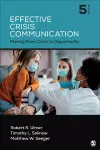
Effective Crisis Communication
3 authors - Paperback
£114.00
Robert R. Ulmer is professor of Communication Studies and dean of the Greenspun College of Urban Affairs at the University of Nevada, Las Vegas. The Greenspun College of Urban Affairs’ mission is to create unique solutions to support community resiliency. His teaching, research, and advisory roles focus on producing effective risk and crisis communication through renewal, growth, and transformation. His current work involves creating transdisciplinary research solutions and engaging public/private partnerships to develop crisis-prepared and response-capable communities and organizations. Recently, the Greenspun College of Urban Affairs launched the MGM Resorts International Public Policy Institute. The Institute is bipartisan (the co-chairs are former Senator Harry Reid and former Speaker John Boehner) and focuses on creating innovative solutions to pressing national social crises. He is also involved in several research initiatives focused on tourist safety, smart cities, urban leadership, community trauma, and community resiliency. His recent and current work is funded by MGM Resorts International, the Centers for Disease Control and Prevention, and the Environmental Protection Agency. He has worked in an advisory role both nationally and internationally for a wide variety of public and private organizations during risk and crisis events. He has served as an advisor on several large-scale oil spills, issues of homeland security and terrorism, financial crises, environmental disasters, food safety crises, and public health and community crises. He has published articles in Management Communication Quarterly; Journal of Applied Poultry Research; Communication Yearbook; Journal of Business Ethics; Public Relations Review; Journal of Organizational Change Management; Journal of Applied Communication Research; Handbook of Crisis Communication, Argumentation, and Advocacy; Public Relations Review; Communication Studies; Handbook of Risk and Crisis Communication; Encyclopedia of Public Relations; International Handbook of Crisis Communication; Handbook of Crisis Communication; and Handbook of Public Relations. Timothy L. Sellnow is a professor of strategic communication in the Nicholson School of Communication and Media at the University of Central Florida in Orlando. Dr. Sellnow’s research focuses on instructional risk and crisis communication to diverse publics, and strategic communication for crisis management and risk mitigation in government, organizational, and health settings. He has conducted funded research for the Department of Homeland Security, the United States Department of Agriculture, the Centers for Disease Control and Prevention, the Environmental Protection Agency, the United States Geological Survey, and the World Health Organization. He has also served in an advisory role for the National Academy of Sciences and the Food and Drug Administration. His work on crisis, risk, and communication has appeared in the Handbook of Crisis and Risk Communication; International Encyclopedia of Communication; Communication Yearbook; Handbook of Public Relations; Handbook of Applied Communication Research; Public Relations Review; Communication Studies; Journal of Business Ethics; Journal of Business Communication, Argumentation, and Advocacy; Critical Studies in Media Communication; Journal of Applied Communication Research; Health Communication; Journal of Health Communication; Risk Analysis; Journal of Contingencies and Crisis Management; and Management Communication Quarterly. Dr. Sellnow is the coauthor of six books and coeditor of two books on crisis and risk communication, and he is the past editor of the Journal of Applied Communication Research and past recipient of the National Communication Association’s Gerald M. Phillips Award for Distinguished Applied Communication Scholarship. Matthew W. Seeger is currently professor of communication and co-director of the Center for Emerging Infectious Diseases at Wayne State University. Dr. Seeger’s research concerns crisis and risk communication, health promotion and communication, crisis response and agency coordination, the role of media—including new media—crisis and communication ethics, failure of complex systems, and post-crisis resilience and renewal. He has worked with the U.S. Centers for Disease Control and Prevention for more than a decade. He is a member of the World Health Organization Guidelines Development Group for Emergency Risk Communication. He has consulted with several Fortune 500 firms on crisis management planning and response. His work has been supported by the CDC, NCFPD, NSF, NIH, and the State of Michigan, with over $7 million in extramural funding. His work on crisis, risk, and communication has appeared in more than 100 peer reviewed articles and book chapters including the Handbook of Crisis and Risk Communication, International Encyclopedia of Communication, Journal of Health Communication Research, Health Promotion Practice, Communication Monographs, International Journal of Crisis and Contingency Management, Communication Yearbook, the Handbook of Public Relations, Handbook of Applied Communication Research, Communication Monographs, Public Relations Review, Communication Studies, Journal of Business Ethics, Journal of Business Communication, Management Communication Quarterly, Journal of Applied Communication Research, and the Journal of Organizational Change Management, among several others. Seeger is the author or coauthor of eight books, most focusing on crisis and risk communication, including Communication and Organizational Crisis (2003), Crisis Communication and the Public Health (2008), Effective Crisis Communication (2007), Effective Risk Communication (2009), Theorizing Crisis Communication (2021), Crisis and Emergency Risk Communication (Second Edition, 2015), Narratives of Crisis: Stories of Ruin and Renewal (2016), and the International Handbook of Crisis Communication (2016). He has advised over 40 doctoral dissertations.